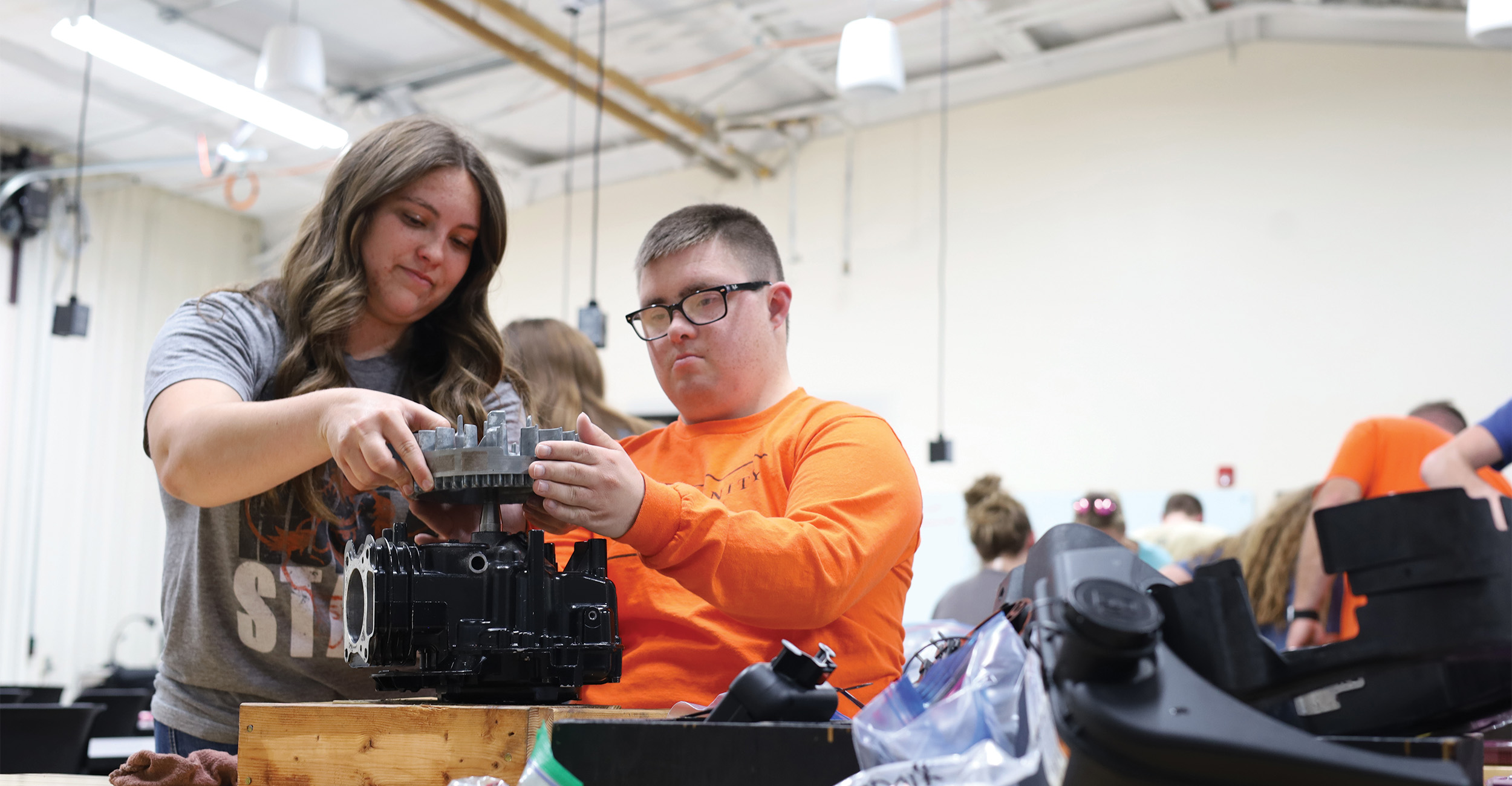
Educating Every Cowboy: Agricultural education program shapes tomorrow's educators
Tuesday, May 28, 2024
Media Contact: Sophia Fahleson | Digital Communications Specialist | 405-744-7063 | sophia.fahleson@okstate.edu
In the realm of agricultural education, instructors and professors at Oklahoma State University devote themselves to preparing undergraduate students for student teaching and their future careers.
Tailored courses within OSU’s agricultural education program cultivate hands-on instruction, said Nathan Smith, agricultural education instructor and coordinator of student teaching placement. The program focuses on practical application in real-world classroom settings through its diverse course curriculum.
Smith teaches agricultural electrification, engines and power, and agricultural structures as five-week, one-credit-hour courses in agricultural systems technology.
“These courses are primarily designed for our future teachers to be able to take a class and get an understanding of agricultural mechanics and what it looks like,” said Chris Eck, agricultural education assistant professor. “However, having students with a variety of academic majors in class with the agricultural education students creates an open and diverse student background.”
The agricultural education curriculum also includes courses to prepare these future teachers to work with students who have individualized education plans.
“Our agricultural education majors pursuing teacher certification take a College of Education and Human Sciences course that involves working with students with exceptional learning needs,” Smith said. “Often, it might be their only introduction to or interaction with exceptional learners.”
“As student teachers, they show how they are appropriately modifying instruction to work with students who have exceptional learning needs,” Smith said.
Smith emphasizes to the future teachers the importance of demonstrating an ability to work with students with exceptional learning needs.
During the 2024 spring semester, students in Smith’s agricultural system technology courses gained firsthand experience working with an individual who had an IEP while taking secondary education courses. This collaboration came through a partnership with the Opportunity Orange Scholars program, which caters to young adults with intellectual disabilities unable to meet OSU’s degree-seeking admission criteria.
Within OOS, students pursue a two-year, non-degree academic certificate in career and community studies while being fully immersed in the college experience.
Matthew Sitton, OOS second-year student, sought an elective class to complement his core OOS program courses. Sitton has an agricultural background and wanted to take the agricultural systems technology courses because “Mr. Smith is an awesome guy,” he said.
The courses present an opportunity for Sitton to learn practical, hands-on skills — life skills — he could use moving forward, Smith said.
“I have worked quite a bit with exceptional learners,” Smith said. “I was more than happy to have Matthew in class. We are all Cowboys.”
Having Sitton in the courses provided fellow students with the opportunity to collaborate one-on-one or in small groups within the laboratory setting, allowing them to observe diverse learning styles within their groups, Eck said.
Through courses across campus — like Smith’s — OOS students can have the opportunity to learn alongside their peers, enabling them to fully embrace the college experience, said Emily Tucker, OOS program director and assistant professor of professional practice.
“In class, I would ask for help and have support with me,” Sitton said. “They encouraged me when I messed up or if I got upset and frustrated with my homework.
“I enjoyed working with them — my classmates,” Sitton added.
OOS students spend considerable time in rigorous classes, Tucker said, but OOS prioritizes developing essential life skills often overlooked.
“For Matt, it’s been a big confidence booster,” Tucker said. “He’s learning tangible skills that have to do with the things he sees every day. It helps him make sense of his world.”
Learning to work with individuals who have different social skills and learning capacities — especially when they learn differently from oneself — is a crucial skill that will benefit any future professional, Tucker said.
“Everyone learns differently,” said Katelyn Kuykendall, agricultural education junior. “Having a variety of students accommodates diversity because we all learn at different levels.”
Kuykendall said helping an OOS student is fulfilling because this course is allowing Sitton to grow.
This opportunity provided firsthand experiences in a classroom setting and hands-on learning, preparing individuals to apply the skills in a classroom one day, said Kaylee Keeler, agricultural education junior.
Smith has worked at OSU for six years and has not had the same level of interaction with exceptional learners as he did in the high school classroom, he said.
“Having Matt in the classroom has reengaged me,” Smith said. “This made me refocus on how I have to go about practicing and implementing some teaching skills and strategies we’re teaching our students.”
The core agricultural education courses guide students to consider the necessity of scaffolding and differentiating instruction to address the diverse needs of learners, Eck said.
“Collaborating with a student like Matt allows me to think through each step more clearly,” said Riley Luginbill, agricultural education junior. “The steps can be altered and fit the needs of all students.”
Having this experience will give Keeler an advantage as she teaches students with various support needs giving her the ability to guide and assist them effectively.
“Collaborating with an OOS student gives me the freedom to see his world and even our world from a whole different perspective,” Keeler added.
Learning alongside and interacting with an OOS student in a classroom or laboratory setting will benefit agricultural education students as they progress, Smith added.
“The agricultural education program shapes tomorrow’s educators, ensuring they are equipped to make an impact on individuals with diverse learning capacities,” Smith said.
Story by: Hannah Wilcocks | Cowboy Journal
